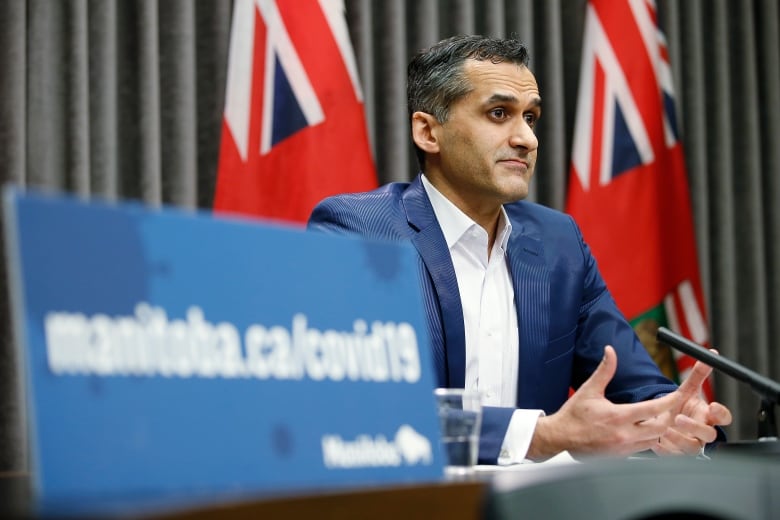With the delta wave on the horizon, Manitoba chooses to surf
Most universities aren't waiting for a vax mandate. Some schools aren't waiting for a mask mandate, either

Over the past few weeks, Manitoba has enjoyed something of a holiday from the pandemic.
Public health restrictions are minimal. COVID-19 case counts are down to a seven-day average of 27 per day. The proportion of COVID-19 tests coming back positive is hovering around a respectable rate of two per cent. The number of patients in hospital with the illness is down to the lowest level since October 2020.
Best of all, the basic reproductive number of COVID-19 is an encouraging 0.87, which means the disease is not spreading in Manitoba.
For now, anyway.
Thanks to the more contagious delta coronavirus variant, COVID-19 is spreading in every province outside Atlantic Canada and wreaking havoc again in the U.S.
For the first time since the end of the second wave last winter, the United States is reporting well over 100,000 new cases per day. The number of cases is still growing at double-digit rates in 46 out of 50 states.
Worst of all, one in five intensive care wards in the U.S. is at or above capacity, largely because unvaccinated people are getting severe cases stemming from the delta variant.
It may be tempting for Canadians to view the American fourth wave with some degree of smugness, given the relatively low vaccination rates south of the border, as well as the political polarization that has led entire states to forgo basic public health precautions.
That would amount to hubris. The fact is, Manitoba public health officials have no idea what will happen here once the delta variant becomes more dominant.
The delta variant still has not been factored into pandemic modelling.

"Right now, with cases being low, we're at a really great time in our COVID experience, but that doesn't mean that that will remain the case," vaccine team medical lead Dr. Joss Reimer said Monday during a news briefing.
She has helped run a successful immunization program that has ensured just over 70 per cent of Manitoba's total population has one dose of a COVID vaccine and almost 65 per cent of Manitobans have two doses.
Most immunologists believe vaccination rates have to be even higher to keep the delta variant at bay.
Vaccination incentives eliminated
Nonetheless, Manitoba chose only weeks ago to eliminate some of its vaccination incentives, including the requirements to get double-vaxxed before you see a movie or eat indoors at a restaurant with someone you don't live with.
Other provinces are adding these requirements now. Reimer hinted they could come back.
"We need to be keeping all of these tools available and looking at the effectiveness, looking at the pros and the cons of every tool, including options to require vaccines in certain locations or certain circumstances," she said.
It is fair to ask why the province would wait. Twice over the past year — before the second wave last fall and before the third wave this spring — a wait-and-see approach with public health measures proved to be disastrous for this province.
Those miscalculations led to the deaths of hundreds of seniors in personal care homes during the second wave and completely overwhelmed hospitals during the third wave.

There are other public entities that are no longer deciding to wait and see what happens with delta this fall.
Late last week, the federal government declared its workers must get vaccinated this fall, as must airline and train passengers.
Then on Thursday, most Manitoba universities and colleges announced they will require all students and staff to be vaccinated if they wish to go on campus, while the Louis Riel School Division declared all of its employees must get double-vaxxed.
The province, meanwhile, is not even requiring that students wear masks when they return to classes, let alone requiring people who work with students to be vaccinated.
Schools will be COVID-19 vector
On Sept. 7, K-12 schools will be host to the largest gatherings of unvaccinated people in the province. No one born later than 2009 can get vaccinated in Manitoba.
The deputy chief public health officer acknowledged classes will serve as a vector for COVID-19.
"We do anticipate case numbers likely will increase to some degree once we have greater activity between individuals" in settings like schools, Dr. Jazz Atwal said on Monday.
"We are working through our public health measures and the guidance" to mitigate that risk, he said, "and once things there are finalized, we will provide that to the public and to those institutions as well."

This sets the stage for a repeat of 2020, when the province initially declared there would be no mask mandate in schools before putting one in place in time for classes to start.
Masks reduce the potential for coronavirus transmission. Vaccinations have been shown to greatly reduce the risk of infection, even by the delta variant, and immensely reduce the risk of serious illness.
Mask mandates are not difficult to re-impose on schools. Sector-specific vaccine mandates raise questions about what happens to workers who refuse to get their shots, but unions and employers are capable of working through these obstacles.
At this late stage of the pandemic, it is incumbent on politicians and public health officials to explain their reluctance to employ these tools to not just reduce the severity of a forthcoming fourth wave — but to prevent it from becoming severe in the first place.

